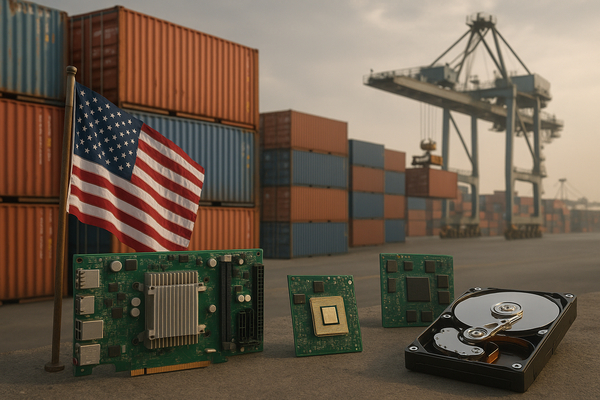
Tariffs are reshaping global supply chains and forcing corporate playbooks to change now. New duty threats and trade friction are pushing chipmakers, cloud providers and manufacturers to reroute production, accelerate regional partnerships, and reprice earnings forecasts. In the short term, this is weighing on China revenue and triggering volatility in semiconductors and e-commerce. Over the long term, it is accelerating supply-chain diversification to India, South Korea and onshore data-centre ecosystems. The story matters from Wall Street to Seoul: U.S. earnings, European industrial exposure and Asian manufacturing strategy are all being rewritten. Compared with past tariff episodes, companies today move faster — shifting contracts, striking sovereign AI deals and redesigning logistics in months, not years.
Tariffs, geopolitics and the immediate market reaction
Trade policy moves this autumn have compelled analysts and executives to reprice cross-border revenue exposure. NVIDIA (NASDAQ:NVDA) drew headlines when analysts said recent tariff rhetoric effectively “zeroed out” the notion of near-term China revenue growth in certain segments. That reaction matters now because NVDA is the market’s main conduit for AI demand, and its sales pattern influences chip supply chains globally.
At the same time, big cloud and platform companies are racing to de-risk. Microsoft (NASDAQ:MSFT), Amazon (NASDAQ:AMZN) and Alphabet (NASDAQ:GOOGL) are expanding data-centre investments and local partnerships to shield customers from sudden trade frictions. Investors are watching guidance closely; when large-cap tech signals less China dependency, it often ripples through supply chains and part suppliers.
How tech giants are rearranging manufacturing and partnerships
Apple (NASDAQ:AAPL) remains a bellwether for hardware supply-chain moves. The company’s recent quarter showed resilient services and free-cash-flow strength, underlining operating flexibility even as manufacturers grapple with tariff uncertainty. That resilience matters now: manufacturers that can migrate assembly or diversify suppliers quickly will protect margins and holiday-season shipments.
Meanwhile, NVIDIA’s major agreement with South Korea — a sovereign-scale AI infrastructure partnership involving local government, chip fabs and hyperscalers — is a real-time example of companies converting trade risk into regional industrial policy wins. Those pacted deployments accelerate local GPU demand and reduce reliance on single-country manufacturing loops.
Amazon’s push on AI shopping assistants and Microsoft’s Azure momentum illustrate another angle: cloud demand can offset hardware revenue swings by boosting software and services receipts. Firms that blend device sales with cloud services can soften tariff shocks by shifting revenue mix.
Regional plays: India, South Korea and a new map for supply chains
Companies are not just talking about diversification — they are acting. South Korea’s sovereign AI deals and local chip investments aim to lock in capacity and data sovereignty. That reduces friction for firms needing onshore compute and mitigates tariff-related exposure.
India is another obvious node. It offers scale, low-cost labor and investment incentives for electronics assembly. For global OEMs, moving labor-intensive final assembly to India shortens the path from policy shock to operational continuity. The near-term effect is logistical cost and retooling pain. The long-term effect is a more resilient, multi-hub manufacturing footprint.
China will remain a critical part of global manufacturing. But firms increasingly hedge by layering India and Korea capacity into their networks. The net result: supply-chain complexity rises, and so do the premiums companies pay for agility.
Sector watch — pockets of resilience and dividend stability
Not all corporate pain is equal. Retail and services companies with dominant digital platforms can reallocate investment; cloud-exposed firms can offset hardware weakness. Industrials and aerospace are vulnerable to trade rules that affect parts and raw materials. Boeing (NYSE:BA), for example, sits in a complex web of international suppliers; any tariff escalation that hits aviation inputs would be watched closely by investors and regulators.
Dividends offer a window on boardroom confidence. Advance Auto Parts (NYSE:AAP) recently affirmed its $0.25 dividend, signaling steadier cash flows in a parts distributor exposed to North American demand. Energy and mining names with predictable cash generation have taken similar stances, and those payouts can temper stock volatility while firms adapt to new trade regimes.
What to watch next
Trade-policy announcements and earnings guidance will be the immediate levers for sentiment. Watch semiconductors and cloud-provider commentary for signs of demand reallocation. Key datapoints include Q4 guidance from major chipmakers, disclosures of new sovereign or regional contracts, and incremental capital expenditure plans for local data centres and fabs.
Regulatory developments — from customs enforcement to export controls — will shape the operational timeline. Companies that disclose concrete supply‑chain moves, regional contract wins or diversified vendor lists will reduce uncertainty. For markets, the lesson is clear: tariff shocks are accelerating strategic shifts that will rewire manufacturing and cloud geography in the next 12–36 months.
Note: This article is informational and does not constitute investment advice.












